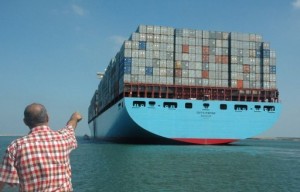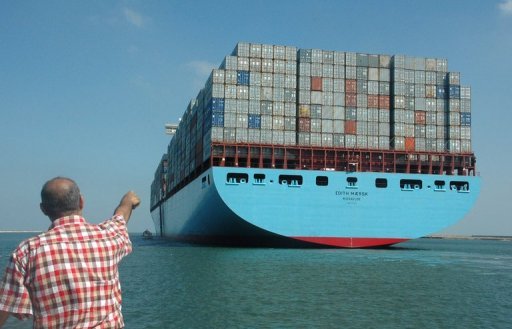
(AFP Photo)
By Inam al-Adawi
The Export Councils have rejected claims that the country’s export rates have been negatively affected by political stances taken by the European Union (EU), South Africa and Turkey regarding events taking place in Egypt. This is despite threats made by South Africa to freeze Egypt’s membership in the African Union (AU), the EU’s various attempts to intervene in the political crisis, and Turkey’s recent shutting down of one of its maritime shipping lines with Egypt.
The positions of Turkey and South Africa will not have an effect on fertilizer exports, revenues from which were described as relatively weak, considering that only 30,000 tons were shipped per year, according to Ahmed Hagras, a member of the Chemical and Fertilizers Export Council.
Expected decreases in exports for 2013 could be attributed primarily to problems related to fertilizer production, gas shortages seen within factories and general decreases in energy production, he added. This will also lead to decreases in the amount of fertilizer stock available on the country’s domestic market.
Walid Abdel Hamid, Director of Planning of the Dreamstone Industrial Company and a member of the Export Council for Building Materials, said the export of building materials to the EU, particularly that of marble, had not been affected by the general position taken by the EU regarding Egypt’s political climate. This is despite recent statements made by Catherine Ashton, in addition to her recent visit with former president Mohamed Morsi.
Egyptian companies are more aware of the types of regulations and restrictions that exist on the European market, for the purpose of better enabling such companies to promote and provide access to their products while avoiding obstacles, and in a way that preserves the reputation of such products, particularly marble and granite, added Abdel Hamid.
Ali Al-Kabir, Director of General Administration for the Export Councils, said the Free Trade Agreement with Turkey, signed in December 2005, would not be affected by Turkey’s recent attempt to close one of its maritime trading routes with Egypt.
Despite the relative sluggishness seen in Egyptian-Turkish relations since the army’s ouster of former President Mohamed Morsi, Al-Kabir said the trade agreements between the two, in addition to Egypt’s partnership agreement with Europe to reduce customs duties on imported cars and vehicles, would not be affected.
Total trade between Egypt and Turkey reached $5.027bn in 2012, with Turkish exports to Egypt totaling $3.46bn. Egyptian exports to Turkey meanwhile totaled $1.567bn. Turkish investments in Egypt during this period totaled $1.5bn, a number which the former hopes to increase to $5bn within the next five years.
Total trade between Egypt and the EU meanwhile totaled $33bn, with Egypt being granted the status of “primary partner” for EU member countries. Such status is particularly significant considering that 76% of tourists entering Egypt in 2010 came from Europe. Despite recent decreases seen in rates of tourism, this number has stabilized in recent years at 70%.
Meanwhile Egypt remains South Africa’s third largest trading partner in North Africa, with total exports to the former reaching $19.8m. South African exports reaching Egypt from January to March 2010 meanwhile totaled upwards of $43.41m.
Translated from Al-Borsa



